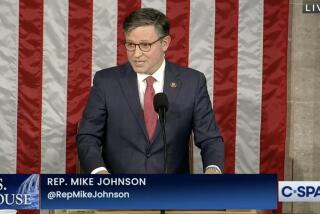Financial regulatory overhaul faces new criticism on first birthday
The most far-reaching overhaul of financial regulations since the Great Depression reached its first birthday with fresh criticism of its effectiveness and a new attack on one of its major reforms.
Republicans and industry groups have used the occasion to lambast the law for what they call dangerous government overreaching. Not only has it failed to heal the economy, they said, but it has added to the uncertainty that has kept businesses from hiring more people.
“It has turned the financial regulatory landscape into a nightmare,” Sen. Richard Shelby (R-Ala.), a leading critic of the Dodd-Frank Wall Street Reform and Consumer Protection Act, lectured top regulators at a Senate hearing Thursday. “I don’t believe … that the American people are in any mood to celebrate just yet.”
Obama administration officials and regulators defended the rules as necessary to prevent another financial crisis. But they also used the anniversary this week to decry the continued opposition on Capitol Hill and Wall Street that they said had slowed implementation of hundreds of new rules designed to protect the economy.
The Republican-controlled House, for example, voted 241-173 Thursday night largely along party lines to weaken the power of the law’s centerpiece, the new agency to protect consumers in the financial marketplace.
A vote is largely symbolic given strong opposition in the Democratic-controlled Senate and by President Obama. But the move demonstrated the continued contentiousness over the government’s response to the financial crisis and attempts to prevent a repeat.
“We must not lose sight of the reason that we began this process: ensuring that events like those of 2008 and 2009 are not repeated,” Federal Reserve Chairman Ben S. Bernanke warned senators Thursday about the financial overhaul. “Our long-term economic health requires that we do everything possible to achieve that goal.”
The Dodd-Frank law, which Republicans almost unanimously opposed, enacted sweeping changes to the financial regulatory system.
In addition to creating the Consumer Financial Protection Bureau, it set up a council of regulators to monitor the financial system for major risks, gave the government the power to seize and dismantle teetering firms whose failure would threaten the economy and imposed the first major regulations of complex financial derivatives.
But a year after Obama signed the legislation, the overhaul remains under heavy attack as regulators struggle to enact its complex pieces.
Financial industry lobbyists have swarmed federal agencies, trying to slow down and reduce the effect of new regulations being drawn up. And House Republicans have proposed cutting the budgets of two key regulators that depend on congressional appropriations — the Securities and Exchange Commission and the Commodity Futures Trading Commission.
The heads of those agencies complained Thursday that they don’t have enough money to implement all the new rules.
“Without sufficient funds, there will be fewer cops on the beat, but also we won’t really even have enough staff to answer the basic questions from market participants and the public on the new rules,” CFTC Chairman Gary Gensler told the Senate Banking Committee.
Despite the increased regulatory workload, the House Appropriations Committee voted in May to cut the CFTC’s budget by $30 million in 2012 to $172 million — $136 million less than Obama requested.
The committee voted a month later to freeze the SEC’s 2012 budget at $1.2 billion. Members rejected the White House’s proposed $222-million increase, even though the SEC estimated that it would collect $1.4 billion in fees next year from companies it regulates.
SEC Chairwoman Mary Schapiro said the agency would have to cut $10 million from its information technology budget, a major blow after it struggled to analyze last year’s Wall Street flash crash.
Sen. Shelby pointed out that the solution to most crises has been to give regulators more resources, but he said that simply increases bureaucracy without preventing future problems.
Republicans have taken sharp aim at the new consumer agency, which officially opened for business Thursday. They charged that the agency, with its single appointed director and broad mandate to police financial products, was too powerful.
“I wouldn’t want George Washington, I wouldn’t want Abraham Lincoln, I wouldn’t want Mother Teresa to have that kind of power,” said Rep. Spencer Bachus (R-Ala.), chairman of the House Financial Services Committee.
Still, House Republicans said they weren’t trying to kill the consumer agency or undermine the financial overhaul.
Their bill would replace the director with a bipartisan, five-member commission, make it easier for other financial regulators to veto its actions and delay the use of its authority until its leadership is confirmed by the Senate.
Democrats contended that the legislation was part of a sustained assault on the financial overhaul.
“Republicans want to delay, de-fund and dismantle the Dodd-Frank law,” Rep. Marcia L. Fudge (D-Ohio) said.







